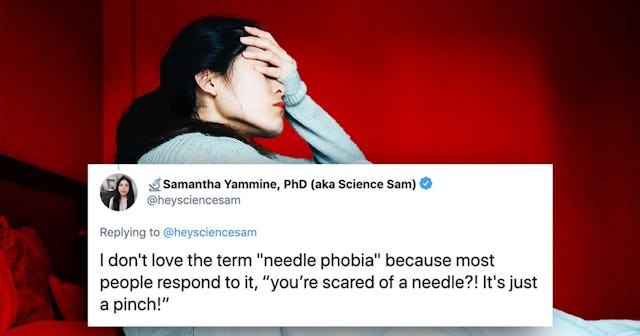Needle Phobia Is Real, And Is A Reason Many Refuse/Delay Vaccination

I used to dread doctor’s appointments while growing up. Not because I hated going to the doctor — there was actually something serene about the whole experience for me and I always loved how clean the doctor’s office was. My dread came from my younger sister’s experience with getting shots.
Since there were four of us, we always had our appointments at the same time because it was easier on my mother.
But what wasn’t easy was my sister’s reaction at the sight of needles. She wasn’t able to calm down, and I now know that she had severe needle phobia, which is why it took a few doctors and my mother to hold her down.
Scary Mommy and
ADAM GAULT/SPL/Getty
At the time, I didn’t understand this and was annoyed and embarrassed by her and the way she would act.
Then, I realized when she passed out while willingly getting her ears pierced, there was more to it than just being a baby, which is what I thought about her when we were younger.
As an adult, she’s explained a few times it’s not because the shot hurts; it’s the thought of it going into her skin. Sometimes she feels like she might pass out at the very thought of a needle.
This is something we all need to realize, and have compassion for those who have needle phobia during this time when many people are getting vaccinated. Dr. Samantha Yammine started an important, and eye-opening, conversation about needle phobia on Twitter, and highlighted some of her own personal experiences that contributed to her phobia.
There will be some people who may delay, or refuse getting their vaccination all together because of their fear of needles. Samantha Yammine, PhD. — a neuroscientist and molecular biologist — is one of them, and she reminds us to be mindful.
Fear of needles, also known as Trypanophobia, affects 3.5 to 10% of people. Verywell Mind reports, “It tends to be more common in children and may lessen as people grow older and gain more experience having medical procedures and injections involving needles. For some people, however, this fear can remain extreme and distressing during adulthood.”
While crying and trying to resist getting a shot is really common in kids who are getting a shot, needle phobia in adults can cause severe anxiety, causing them to put off getting them all together. After all, it’s hard to willingly put yourself through something that absolutely terrifies you.
There can be several reasons for the phobia. My sister explained to me that she gets so anxious it leads to blacking out, a cold feeling in her head, throwing up, even passing out, saying, “I know it has something to do with people witnessing me going through this and the person giving me the shot, or taking my blood, not being patient or compassionate about it.”
Trypanophobia can also be triggered by having a bad experience while getting a shot, or witnessing an adult struggle with getting shots. Watching someone they love get a shot then passing away, like a grandparent, can also instill a fear of needles into someone.
So, even if it may seem like no big deal to you to get a shot, and there’s no anxiety leading up to getting your COVID-19 vaccination, it’s not like that with someone who has a needle phobia. In fact, it can be all-encompassing and consume all their thoughts. This doesn’t mean they don’t want to protect themselves and others from COVID, but it is a lot more of an ordeal for them than it is for someone who isn’t afraid of needles — and we need to realize, and be compassionate about, the level of anxiety and stress it can give them.
There is help out there, and there are ways to help. As for my sister, she’s worked hard to get past her anxiety and omits anything that can make her anxiety spike like too much sugar. She stays really hydrated and tells the person administering the shot or drawing blood what can happen and she requests to lie flat and have a cool cloth. “I have to do this every single time because when I think I’ll be fine and can handle it, I don’t say anything and it always goes sideways,” she says.
Let’s realize there are people who may not be running to get the vaccination right away because they do suffer from needle, or medical, anxiety.
What they need is to be met with compassion. Pressure and criticism certainly isn’t going to make them run to get a shot any sooner, but understanding might.
You can follow @heysciencesam on Twitter here.
This article was originally published on